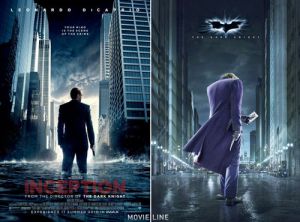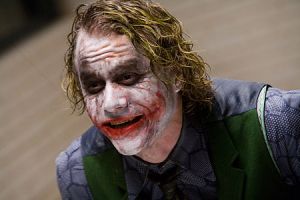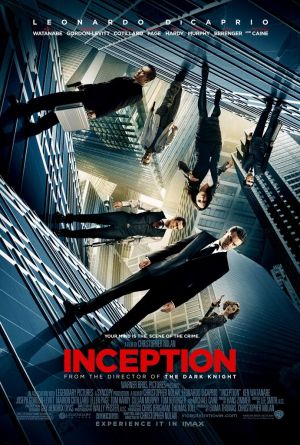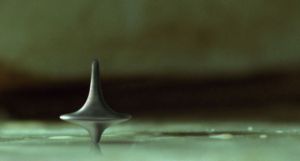Inception vs. The Dark Knight
By Andy Frisk
February 27, 2011 - 15:41
The Academy has nominated Christopher Nolan’s sci-fi adventure/thought piece Inception for the Oscar for Best Picture. It’s almost like a backhanded compliment to a filmmaker whose phenomenal film The Dark Knight should have been nominated for, and awarded, an Oscar for Best Picture of 2008. This statement isn’t meant to take anything away from Inception as a film. Inception is a cinematic work of art. It’s visually appealing, intelligent, very well written, and showcases some great acting by old pros like Leonardo Dicaprio and relative newcomers like Ellen Page. Inception though in many ways is inferior to The Dark Knight, the film that lead to the expansion of the number of films that are now nominated for Best Picture. My readers might think that I say this because I write for a comic book site and, like legions sequential art, film, and superhero fans, I still feel shorted out of an opportunity to point to a “superhero” movie and say it was the Best Picture as evidence that superhero tales are literary and artful. While part of me might feel this way, the more objective and rational part of me looks at the two films and finds some comparison of relevance, but when stacked next to one another, The Dark Knight stands out as the better of the two thematically. Again, while Inception might be a great film, it really isn’t of the quality that The Dark Knight was. The Academy is offering a too little, too late consolation prize to Nolan, a director and screenwriter who deserves so much more.
 |
To begin with, both films are very well acted. Leonardo Dicaprio and Christian Bale, as the leads in their respective films, are captivating. They are both believable and relatable to. The strength with which they emotionally convey their characters convictions, motivations, triumphs, and losses is nothing short of an exercise in masterful acting. Comparing Dicaprio and Bale to one another is almost like comparing apples and oranges, as clichéd as that phrase is. When considering the main supporting actors in the films, one must compare Marion Cotillard’s performance as Cobb’s (Dicaprio's) deranged wife with Heath Ledger’s performance as The Joker. Taking nothing away from the great talent that Marion Cotillard is as an actress, Heath Ledger’s performance (for which he was awarded a posthumous Oscar) was a much more difficult one to pull off than Cotillard’s was. Granted, Cotillard’s role did call for a similar extremism of range like Ledger’s did, but the fact that Ledger’s Joker was a much more complicated a role than Cotillard's Mal was hints at the thematic differences (and similarities) in the films and their relevance (which we will get to shortly). Ledger had to immerse himself in a role, that in order to pull off effectively and realistically, he had to descend mentally into a sort of insanity, or deeply disturbed intelligence (a la Hannibal Lecter), that is really only convincing when the actor actually begins to rewire his own thought process to match such insanity. Reportedly, Ledger locked himself away in hotel rooms for months while mentally and physically preparing for the role. Ledger really only played heroic or emotionally tortured characters prior to his role as The Joker. His performance as The Joker though elevated the character to a level equal with the most legendarily horrible yet charismatic Hollywood villains, like the aforementioned Hannibal Lecter. Cotillard portrayed a very convincing, yet oft seen, distressed mother and wife who gradually lost her grip on reality and became a coldly detached and vicious construct of Cobb’s mind. Her beauty is matched only by her incredible acting ability, but her role really isn’t anything that we’ve seen a multitude of actresses pull off, if not as powerfully in every instance, at least as capably. There never has been, and most likely never will be, a performance by an actor as The Joker that will rival Ledger’s interpretation of the character.
 |
Upon considering The Joker and what he represents in The Dark Knight, a consideration of the two films’ themes must logically follow. Both Batman and The Joker thrive off of fear. Batman invokes a righteous fear while The Joker invokes a terroristic fear. The Joker takes his philosophy one step further though. He embraces chaos, an utterly frightening scenario where fear reigns supreme and there is no order. The Joker claims that he’s an “agent of chaos” and that he doesn’t have a plan. He claims that Gordon, Batman, and the others trying to hold Gotham City together against his chaotic assault are “schemers.” The Joker comes off as a sort of prince of lies though (yes, I’m making a Satan reference), because in order for him to carry out his “chaos” events (the bombing of Gotham General Hospital, his plan to get caught so that he can carry out his double murder attempt on Rachel Dawes and Harvey Dent, etc) he must plan extensively and extremely. How does an agent of chaos, who claims he’s a “dog chasing a tire…who wouldn’t know what to do with it if he caught it,” who just “does things” (suggestively without thinking) pull off the incredible crimes he does without being a master schemer himself? Paradoxically, The Joker reveals a truth about chaotic nature (or a chaotic force of nature—if you will): even at the heart of what appears to be chaos—there is order and a chain of events that lead to it. The Joker is no agent of chaos. He is a master criminal with a message. This theme of chaos vs. order plays out throughout the entire film. With the masters of order: Batman, Gordon, and Dent (before his accident) trying to establish and maintain the status quo order while the “agent of chaos” (who’s really just a proponent of another type of order) tries to destroy the status quo. When Harvey Dent falls victim to The Joker’s madness, Dent becomes blinded and truly loses his grip on reality by succumbing to the illusion of chance and luck—two entities that the two sides of order that Batman and The Joker represent seriously cast doubt upon the existence of. Order underlies everything, even if it appears to be chaotic. The theme of chaos vs. order, or the illusion of chaos vs. order is just the tip of the iceberg of thought provoking themes that can be gleaned from a careful examination of The Dark Knight as a film.
 |
Inception deals mostly with the theme of illusion vs. reality. Cobb is constantly questioning the reality of his surroundings due to his intense and extensive travels into his and others’ dream worlds. If one were to take the above paragraph with its examination of The Dark Knight’s themes and replace each instance of The Dark Knight with Inception, and each instance of chaos vs. order with illusion vs. reality, you would (with some minor tweaking of character names and grammar) be able to sum up Inception’s main theme just as succinctly. While one film deals with the more philosophical, and therefore less visceral, theme of illusion vs. reality, the other deals with the very real and tangible theme of chaos vs. order, a theme that is much more relevant to our real world with its terrorism, peaceful and violent uprisings, and constant debate between how we as societies, cultures, and nations define what chaos and order are. It may seem like I’m dismissing Inception’s main theme rather flippantly by glazing over it here and comparing it to a fill in the blank copy cat, but while it is a very engaging philosophical idea, the structure of the argument of illusion vs. reality in Inception is the same as the structure of the argument of chaos vs. order in The Dark Knight…The Dark Knight and its theme simply came first…and was unjustifiably overlooked by the Academy because it was a “comic book film.” Anyone who saw The Dark Knight, and a lot more people saw it than saw Inception, can tell you with the utmost certainty that not only are “comic book movies” not kid stuff anymore, they are not necessarily throwaway escapism anymore either. There’s a difference between being labeled “adult” and “mature.” The Dark Knight is a mature film in every way. Inception is too, but again, The Dark Knight came first and deserved to recognized as a Best Picture nominee much more justifiably than Inception.
 |
So in summary, Christopher Nolan’s brilliant Inception and equally brilliant The Dark Knight are films that use unconventional characters and premises to carry out some pretty striking philosophical, ethical, and practical debates. The Dark Knight is the film that carries more relevant punch though with its themes of terror, chaos, order, and the lengths to which driven and extreme personalities will go to in order to force their model of order on others. It is a theme that we see playing out all around us every day around the globe, and as long as extremists continue to battle, the vast majority of moderates risk being caught in the destructive middle…unless they exert their own philosophy…perhaps this is where Nolan is going next with The Dark Knight Rises…one can only imagine.
Related Articles:
Top 100 Comic Book Movies book review
VIZ Media Announces "Ranma 1/2" OVA and Movies Collection
Free horror movies at Shout Factory website
Best of #SDCC - Movies
Free Street Fighter Movies on Hulu
VIZ Media and Neon Alley to Screen Two "Berserk" Movies
The Binquirer, Post-Con Edition: The future of Waid's Thrillbent, new Marvel movies, Neil Gaiman's return to Vertigo, and much more!
New Pokemon Movies Out on DVD
A Tale of Two Comic Book Movies
Fantagraphics Books Announces "Destroy All Movies" and Book Tour
